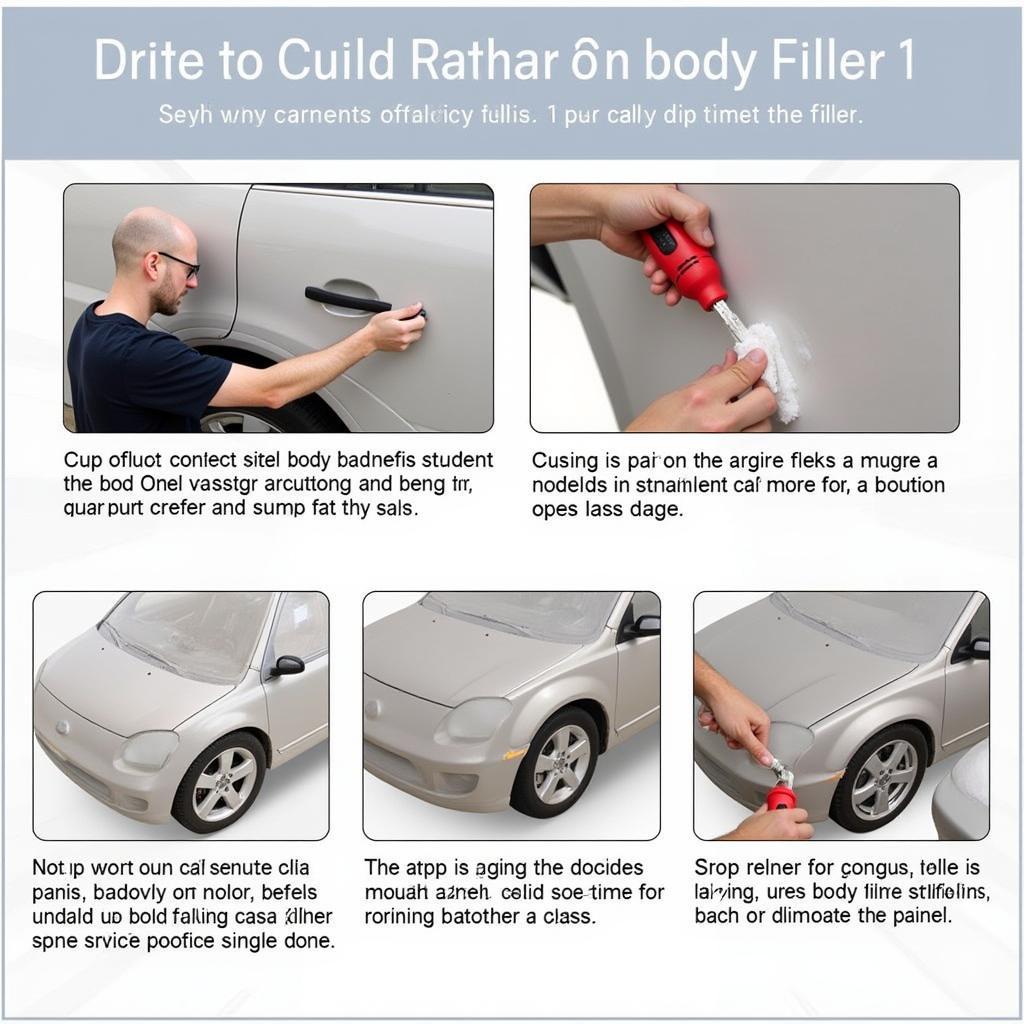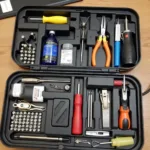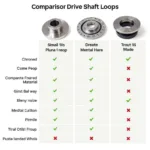Car accident repair tools are crucial for restoring a vehicle to its pre-accident condition. Whether you’re a professional mechanic or a DIY enthusiast, understanding the right tools for the job is essential for efficient and effective repairs. This guide will delve into the various types of car accident repair tools, their uses, and how to choose the best ones for your needs.
Understanding the Different Types of Car Accident Repair Tools
Car accident repair often involves a range of damage, from minor dents and scratches to major structural damage. Consequently, different tools are required for each stage of the repair process. Broadly, these tools can be categorized into:
- Bodywork Tools: These tools are used to reshape and repair damaged body panels. Examples include hammers, dollies, body files, and sanding blocks. Choosing the right bodywork tools is essential for achieving a smooth, flawless finish.
- Mechanical Tools: Mechanical damage often accompanies body damage. Wrenches, sockets, screwdrivers, and pliers are essential for dismantling and reassembling mechanical components.
- Welding and Cutting Tools: For more severe damage, welding and cutting tools are necessary. MIG welders, TIG welders, plasma cutters, and oxy-acetylene torches are commonly used for repairing structural damage.
- Measuring and Diagnostic Tools: Accurate measurements are critical for precise repairs. Measuring tapes, calipers, and diagnostic scanners help ensure that the repaired vehicle meets factory specifications.
- Safety Equipment: Safety should always be a top priority. Gloves, safety glasses, and respirators are essential for protecting yourself from hazards during the repair process.
 Choosing the Right Body Filler and Application Tools
Choosing the Right Body Filler and Application Tools
How to Choose the Right Car Accident Repair Tools
Selecting the right car accident repair tools can be overwhelming, given the wide variety available. Here are a few key factors to consider:
- Type of Damage: The extent and type of damage will dictate the necessary tools. Minor dents may only require basic bodywork tools, while major structural damage will necessitate welding and cutting equipment.
- Skill Level: If you’re a DIY enthusiast, start with basic tools and gradually expand your collection as you gain experience. For complex repairs, it’s always best to consult a professional.
- Budget: Car accident repair tools can range from affordable to very expensive. Set a budget and prioritize the essential tools based on your needs and skill level.
- Quality: Investing in high-quality tools will ensure durability and better results. Look for reputable brands known for their reliability and performance.
car mechanics understanding vehicle diagnostics
What are the most common car accident repair tools?
Some of the most common tools include hammers, dollies, body files, sanding blocks, wrenches, sockets, screwdrivers, pliers, MIG welders, TIG welders, plasma cutters, and oxy-acetylene torches. Don’t forget about measuring tools like tapes and calipers.
How can I learn more about using car accident repair tools effectively?
Many online resources, tutorials, and courses can help you develop your skills in using these tools. Hands-on experience is invaluable, so consider practicing on scrap panels or seeking guidance from experienced mechanics.
“Investing in high-quality car accident repair tools is essential for achieving professional-grade results,” says John Smith, a seasoned auto body repair technician with over 20 years of experience. “The right tools can significantly impact the efficiency and accuracy of the repair process.”
Conclusion
Car accident repair tools are essential for restoring a vehicle to its pre-accident condition. By understanding the different types of tools, their uses, and how to choose the right ones for the job, you can ensure efficient and effective repairs. Whether you’re a professional or a DIY enthusiast, investing in quality car accident repair tools is crucial for achieving optimal results. car mechanics understanding vehicle diagnostics Remember, safety is paramount, so always prioritize using the appropriate safety equipment.
“Accurate measurements are the cornerstone of successful car accident repairs,” adds Jane Doe, a certified automotive engineer. “Using precise measuring tools ensures that the repaired vehicle meets the required specifications and performs optimally.”
FAQ
- What are the essential tools for a beginner in car accident repair?
- What are the safety precautions to take when using car accident repair tools?
- What are the different types of welding techniques used in car accident repair?
- How can I ensure the accuracy of my repairs using measuring tools?
- Where can I find reliable suppliers of car accident repair tools?
- What are the best practices for maintaining car accident repair tools?
- How do I choose the right type of body filler for different types of damage?
Need further assistance with car diagnostics? Explore our other helpful articles on DiagFixPro.com.
For any inquiries or support, contact us via WhatsApp: +1(641)206-8880, Email: [email protected] or visit our office at 910 Cedar Lane, Chicago, IL 60605, USA. Our customer service team is available 24/7.

